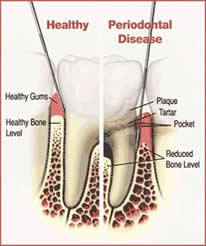Gum disease treatment methods depend upon the type and severity of the disease. Your Dental Health dentist and hygienist will evaluate your case and recommend the appropriate gum disease treatment. Gum disease is the leading cause of tooth loss among adults, and the infection releases toxins into the bloodstream leading to serious health risks. Helping you prevent gum disease in your mouth is one of our most important priorities.
The diagnosis of gum disease often comes as a shock because many people don’t see any signs of gum disease and they feel that they take “good enough” care of their teeth. Although this mild form of gum disease often goes undetected by the person who has it, it can cause gums to bleed when brushing or flossing. People who need early gum disease treatment may also notice chronic bad breath, a bad taste in their mouth, or swollen gums. Menstrual periods and pregnancy may also cause inflamed gums for women. It can also occur in diabetics, smokers, and people under stress.
At Dental Health, we will do a thorough exam, including x-rays, visual inspection, and an analysis of hard and soft tissue. We will also discuss not just your oral hygiene habits, but also diet and lifestyle issues which studies have shown have a strong impact on the health of your gums. If we catch inflamed gums early enough, the problem can usually be reversed with daily brushing and flossing, and regular cleaning. This form of gum disease does not include any loss of bone and tissue that hold teeth in place.
More Serious Gum Disease Treatment
If the gum disease has progressed to more advanced stages, a special cleaning called deep cleaning will be recommended. In this procedure, tartar, plaque, and toxins are removed from above and below the gum line, and rough spots on root surfaces are made smooth. This procedure helps gum tissue to heal and pockets to shrink. Medications, special medicated mouth rinses, and an electric toothbrush may be recommended to help control infection and promote healing.
If the pockets do not heal after scaling and root planing, periodontal surgery may be needed to reduce pocket depths, making teeth easier to clean. This helps gums heal and prevents future plaque build-up. You may also need surgery to repair bone damage, or you may need a tooth extracted if the damage is too severe.
While there are numerous gum disease treatment options, prevention is the best way to avoid the need for gum disease treatment. By focusing on preventive health and oral hygiene through the use of an effective oral hygiene regimen, you can keep your gums and teeth healthy.
More from WebMd.com about gum disease treatments and gum disease surgery .
If you would like to know more about your gum disease treatment options, call today today to schedule a complimentary consultation.

